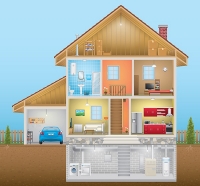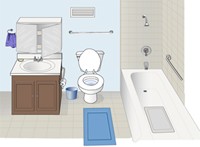Healthy Homes - Bathroom
Health and safety tips
- Wash hands to prevent the spread of many illnesses.
- Use the fan to ventilate the room to the outside to prevent mold and mildew.
- Keep medicines out of reach of children. Use medicines only as directed. Dispose of expired medicines properly.
- Use nonslip mats in bathtubs and showers and on floors. Install grab bars in showers and tubs and next to toilets.
- Keep cleaning products out of reach of children.
- Check water temperature before putting young children into the bathtub. Water should not exceed 120º F.
- Always supervise young children in bathtubs.
Household product safety
What’s under your bathroom sink? Learn more about what’s in these products, about potential health effects, and about safety and handling from the What's in Products Website.
Disposing of unwanted medications
The Tennessee Department of Environment and Conservation has partnered with local law enforcement and solid waste officials across Tennessee to develop ways to take back unwanted pharmaceuticals. There are now permanent collection drug take-back boxes and temporary collection events capable of accepting and properly disposing of unwanted pharmaceuticals. Permanent collection centers are usually hosted and operated by law enforcement agencies or medical facility vendors. Various local law enforcement agencies host temporary collection events for their community. Check TDEC’s Unwanted Pharmaceuticals Take Back Map for listings of permanent medication collection sites.
Lead in bathtubs
Some bathtubs can contain lead. Cast iron or steel tubs can have a porcelain or enamel coating. As the coating wears down from age and use, the lead can leach into bath water. Young children who drink bath water or put their wet hands or toys in their mouths during bath time are at greatest risk. For more information about lead, visit our lead webpage.
Mold and moisture
Moisture is common in the bathroom. Water can splash out of the bathtub, shower or sink. It can leak from pipes under the sink, behind the toilet or between the walls. Water vapor steams from hot baths and showers. Mold and mildew can grow quickly with moisture. Soap and water, store-bought cleaners and scrub brushes can all be helpful in controlling mold. The best way to not have mold in the bathroom is follow the healthy home principle to keep it dry.
Using a fan that exhausts to the outside or leaving the door partially open when showering can help reduce humidity in the bathroom. Mopping up spills and quickly repairing any leaks will help to keep your bathroom clean of mold and mildew. If water damages hard surfaces such as tile, porcelain or countertop, it can be thoroughly dried. If water soaks into carpet, carpet pad, drywall, plaster or other materials, these porous materials usually need to be replaced. For more information about mold and moisture visit our mold webpage or the resource links below.
What about mercury thermometers and light bulbs?
For questions about mercury in your home, see our mercury page.

Additional resources
Poison Center 1-800-222-1222
www.vumc.org/poison-control/home
Tennessee Department of Health
Environmental Health Topics
www.tn.gov/health/cedep/environmental/environmental-health-topics/eht.html
U.S. Environmental Protection Agency (EPA)
Mold and Moisture in Your Home
www.epa.gov/mold
WaterSense
www.epa.gov/WaterSense
Pharmaceuticals and Personal Care Products in Water
water.epa.gov/scitech/swguidance/ppcp
U.S. Drug Enforcement Agency (DEA)
Office of Diversion Control
www.deadiversion.usdoj.gov/drug_disposal/takeback
U.S. Department of Housing and Urban Development (HUD)
Help Yourself to a Healthy Home
www.hud.gov/sites/documents/DOC_11880.PDF
